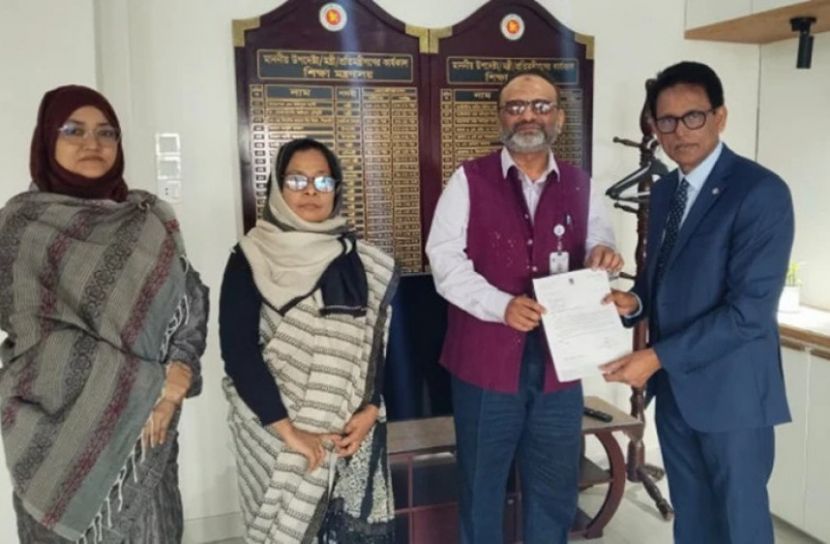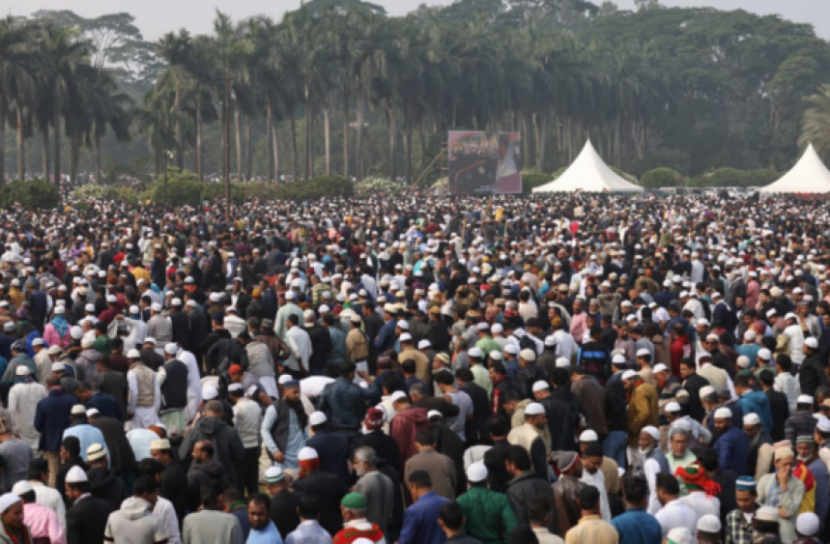
Inward remittance of the country shrinks by 23%

VC Niaz Ahmed Khan resigns

One dies while attending Janaza!

Bangladesh will not join ICC T20 World Cup in India

Muktijuddho Keno Anibarjo Chhilo(why liberation war was inevitable) is the Bengali translation of Dr. Kamal Hossain’s original English work which was written in 1974 and was compiled in the 15th volume of Bangladesh Shadhinata Juddho Dalilpatro.
Later it was successively published in Daily Bhorer Kagoj and was first published by Bhorer Kagaj Publication as a complete book. The book provides a historical account of Bangladesh’s Liberation War and the events leading up to the immediate prior days, focusing particularly on the political and constitutional developments that led to the liberation war of 1971. This review evaluates the book’s strengths, limitations, and its contribution to academic discourse on the Liberation War.
The author of the book Dr Kamal Hossain was born on April 20, 1937, He is a founding leader, lawyer and politician of Bangladesh, and is regarded as an icon of secular democracy in the Indian subcontinent. Dr Kamal Hossain studied at the University of Notre Dame and the University of Oxford, where he earned degrees in economics, jurisprudence, and international Law. He was called to the bar by Lincons-inn in 1959 and became an advocate in the high court at Dhaka in the same year. Dr. Kamal Hossain has held significant positions, including serving as the Law Minister and Foreign Affairs Minister of Bangladesh. He is one of the key architects of the Constitution of Bangladesh.
The central argument of Muktijuddho Keno Anibarjo Chhilo is that the Liberation War was an unavoidable outcome of prolonged economic, political, and cultural oppression by the ruling establishment of Pakistan.During the culminating preparation phase of Bengali's fight for independence, political and constitutional discussions were held under the leadership of Bangabandhu Sheikh Mujibar Rahman. During those turbulent times, Dr. Kamal Hossain participated in numerous political debates and activities, both formal and informal. He has closely witnessed the violations of agreements and conspiracies by Ayub Khan, Yahya Khan, Zulfikar Ali Bhutto, and their followers.He served as the chief legal negotiator for Sheikh Mujib during the tripartite talks with Yahya and Bhutto before March 1971.. As an eyewitness and stakeholder in these events, the author, Dr. Kamal Hossain offers a rare and insightful perspective, combining narration of personal experience with a commitment to maintain objectivity in looking at the incidents.
The book details the political climate of East Pakistan from the 1965 Indo-Pak war to the events of March 25, 1971. It describes the disparity between East and West Pakistan in legal, administrative, and economic spheres. Dr Hossain, a key figure in constitutional discussions under the leadership of Bangabandhu Sheikh Mujibur Rahman, describes discrimination against East Pakistan and the political maneuvering systematically.
After the 1965 war, the Punjabi army and political leaders were dissatisfied with Ayub Khan, to weaken Ayubs Position they sought to align with Bengalis to form a national government. The Bengalis prioritise the issue of regional autonomy. In 1966, Sheikh Mujibur Rahman, a leader of the Awami League, proposed regional autonomy of Bengal in a meeting with Ayub Khan but was rejected. As a result, Sheikh Mujib initiated the six-point movement with the people's mandate. The majority population in Pakistan contributed significantly to the national economy through exports such as jute, but East Pakistanis felt politically deprived. This consequent and persistent discrimination created agitation among economists, politicians, and intellectuals led to the historical six-point movement.
Sheikh Mujibur Rahman showed unwavering determination despite countless obstacles from the central government and other East Pakistani political parties. His firm stance and leadership, mass support made him the symbol of Bengali nationalism. However, the Ayub administration labelled Sheikh Mujib and the six-point movement a militant nationalist trend and declared to answer the protests in the language of weapons. On April 18 Sheikh Mujib was arrested, triggering widespread crackdowns, including the shutdown of the Bengali newspaper Ittefaq, the then spokesman of Bengali Nationalism, arrested its editor Manik Mia. Ayub Khans' Administration suited the historical Agartala Conspiracy case. The author shared Intricate details of the legal proceedings and the political tension surrounding the case as he served as a layer of the Agartala Conspiracy case.
Ayub Khan's stock was down in both east and west Pakistan and a mass movement against his rule gained momentum in 1968. During this period, DUCSU president Tofayel Ahmed formed a new student committee that introduced an 11-point demand charter, expanding upon the six-point movements. After prolonged negotiations and legal battles in which the author played an active role, Sheikh Mujibur Rahman was released on 22nd February 1969. The next day, in a mass gathering of over a million people, he was given the title Bangabandhu.
This book provides a detailed account of the political tension between the central government and the people of East Pakistan. Sheikh Mujib’s refusal to compromise on the Six-Point Plan despite government resistance and military threats further credited his position among the people of East Pakistan.However, the Awami League’s overwhelming victory in the 1970 elections, securing 167 out of 169 seats in East Pakistan, gave Mujib an unassailable political mandate.After leading several rounds of meetings between the East and West wing leaders, the negotiations ultimately failed due to their unwillingness to be reasonable with the people of the West.
Inan incident of an Indian Airlines plane hijacking in Lahore, India suspended all overflights of Pakistani aircraft overIndian territory, significantly increasing travel difficulties between east and west Pakistan. By this time Sheikh Mujib and the student leaders were considering a declaration of independence as an option. The author was tasked with drafting the declaration while Awami League leaders continued pressing for the convening of the national assembly. Bhutto however remained opposed to negotiations.
On 19th February, The tension among everyone intensified as signs of military action began to surface in Dhaka. Yahya Khan indefinitely postponed the national assembly session, effectively depriving Bengalis of their majority and the announcement provoked outrage. Sheikh Mujib called a non-cooperation movement. D. Kamal Hossain, along with Tajuddin Ahmed and Amirul Islam, played a crucial role in drafting the central directives.A formal declaration of independence was widely anticipated, but in the speech of 7th March Sheikh Mujib balanced restraint and defiance with a defining statement “Our struggle now is for independence our struggle now is for freedom”.
In final chapters of the book delve into the critical moments of March 1971. Through consecutive ongoing negotiations, Yahya Khan ordered General Tikka Khan to initiate Operation Searchlight, a brutal crackdown on Dhaka on March 25.Dr Hossain’s firsthand account of these discussions and the subsequent genocide provides a crucial understanding of the inevitability of the war.
A major strength of the book is its emphasis on constitutional discourse. Dr. Hossain, being instrumental in drafting Bangladesh’s post-independence constitution, provides a detailed legal analysis of the struggles faced by East Pakistanis in securing political autonomy. He also critiques the failure of legal frameworks, such as the Government of India Act 1935 and Pakistan’s successive constitutions, in addressing the demands of Bengali self-determination.
In the book Dr. Kamal Hossain used an autobiographical approach and this is one of the strengths of this book. He critically examines constitutional and administrative issues, offering readers an in-depth understanding of the historical context.This book is the narrative of the personal experience of the author of those turbulent days of history, he remained objective while describing the events, even when he wrote about the killing of a close one, srg Jahurul Haque, one of the accused of the Agartala Conspiracy case, who had been shot dead by a military guard while in the custody. The author made a conscious effort to remain unaffected by his surroundings and remained committed to presenting the events and their aftermaths with integrity. The date, time and detailed facts are marked in every event, which makes the book important evidence for Bangladesh's liberation war history. As the author is a lawyer the events he has inscribed he did critically, he answered the legal and administrational facts that will resolve the the curiosity of the readers concisely.
The book also critiques West Pakistan's official narratives, including the government's white paper for distortion of history and provides well-researched arguments to counter any attempts to downplay the necessity of the war. The book offers invaluable insights into the political, economic and military developments leading to 1971, providing a factual narrative of the emergence of Bangladesh.
The book primarily emphasizes the constitutional and political failure of Pakistan but does not deeply explore the mass uprisings, the role of student movements and grassroots activists, which played a crucial role in mobilizing the masses, is not given enough emphasis. While Pakistan's actions and repressions are well discussed this book does not deeply analyze the role of international actors, such as India's strategic decisions, the soviet union's support and the US-China-Pakistan nexus.
Muktijuddho Keno Anibarjo Chhilo is an essential resource for scholars and students of South Asian history, political science, and constitutional law. It provides a detailed and well-reasoned argument on why the Liberation War was not just a spontaneous rebellion but a necessary historical event shaped by decades of systemic oppression. The book is particularly useful for understanding the legal and political underpinnings of the conflict, making it a valuable addition to academic discussions on postcolonial state formation. Dr. Kamal Hossain’s legal expertise and personal involvement lend credibility to the narrative, making this book a significant contribution to the historiography of the Liberation War.
The writer is a final year student at Department of Drawing and Painting Faculty of Fine Art, University of Dhaka.
Courtsy: Bangladesh Observer
Sun News/ra
Newsletter
Subscribe to our newsletter and stay updated.


